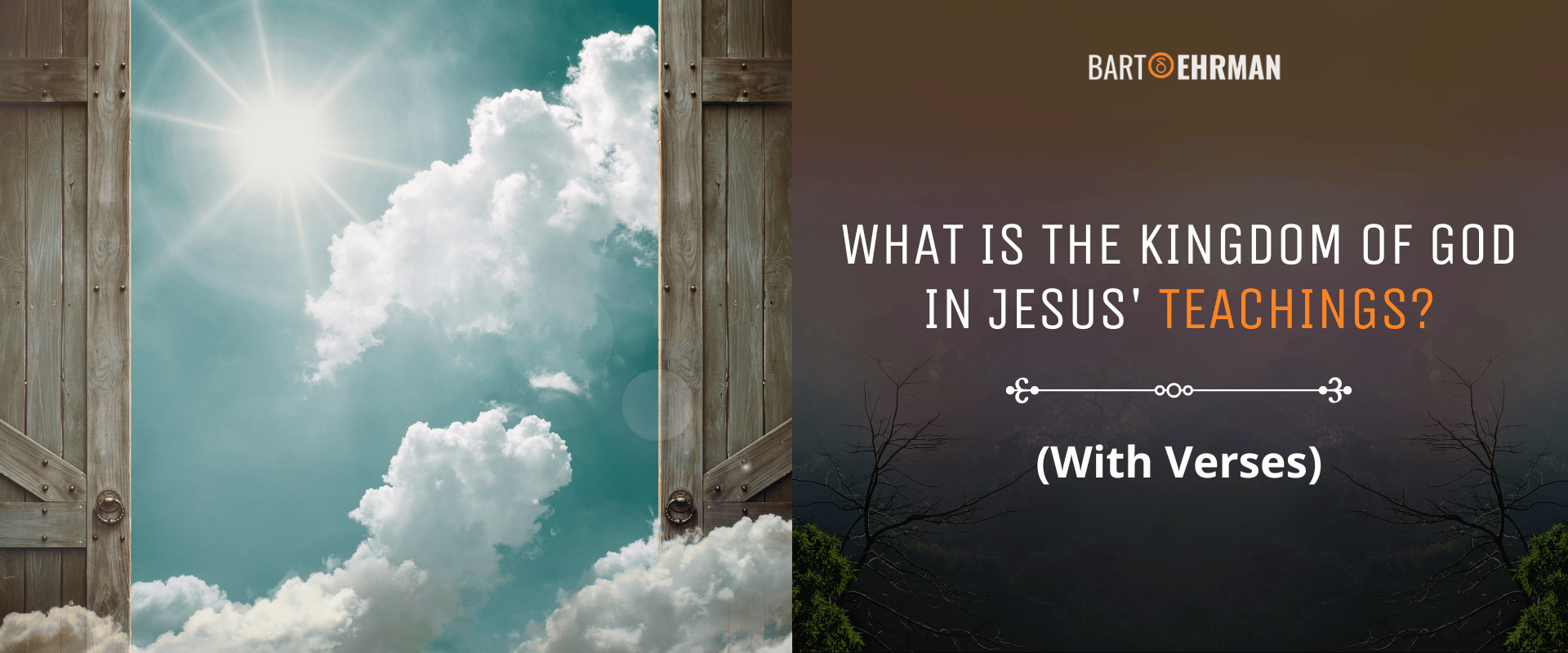What is the Kingdom of God in Jesus' Teachings? (With Verses)

Written by Joshua Schachterle, Ph.D
Author | Professor | Scholar
Author | Professor | BE Contributor
Verified! See our editorial guidelines
Verified! See our guidelines
Edited by Laura Robinson, Ph.D.
Date written: August 19th, 2024
Disclaimer: The views and opinions expressed in this article belong to the author and do not necessarily match my own. - Dr. Bart D. Ehrman
The concept of the Kingdom of God stands at the heart of Jesus' teachings in the Synoptic Gospels, shaping much of Christian thought and eschatology. But did this notion originate with Jesus, or was it part of a broader tradition? To understand the Kingdom of God in Jesus' doctrine, we must explore its historical roots in Jewish Scripture and tradition.
In examining Jesus' perspective on the Kingdom of God, I’ll investigate how he described it, how it relates to the concept of the Kingdom of Heaven in Matthew, and what this means for our understanding of his message. I’ll also provide a table of Kingdom of God verses.

What is the Kingdom of God in the Hebrew Bible?
The concept of the Kingdom of God is one of the main focal points of Jesus’ ministry in the Synoptic Gospels. As Bart Ehrman points out, the first written reference we have to Jesus’ teaching in our oldest written Gospel is an apocalyptic message about the Kingdom where he says
The time is fulfilled, and the Kingdom of God has come near (or is at hand); repent, and believe in the good news.
Did Jesus invent the idea of the Kingdom of God? In fact, it turns out that the concept had a long history in Judaism long before the life of Jesus. Let’s look at that history in the Hebrew Bible.
In Pure Kingdom: Jesus' Vision of God, Bruce Chilton notes that the concept of God as a king can be traced in some sense all the way back to the Pentateuch. (Affiliate Disclaimer: We may earn commissions on products you purchase through this page at no additional cost to you. Thank you for supporting our site!)
In Deuteronomy 30:1-10 God says
For the Lord will again take delight in prospering you, just as he delighted in prospering your ancestors, when you obey the Lord your God by observing his commandments and decrees that are written in this book of the law, because you turn to the Lord your God with all your heart and with all your soul.
Like an earthly king, God promises to reward his people if they are loyal to him and obey his “commandments and decrees.” Other Hebrew Bible books make similar pronouncements about God as king:
1 Chronicles 29:11
Yours, O Lord, is the greatness and the power and the glory and the victory and the majesty, for all that is in the heavens and in the earth is yours. Yours is the kingdom, O Lord, and you are exalted as head above all.
Psalm 45:6
Your throne, O God, is forever and ever.
The scepter of your kingdom is a scepter of uprightness.
Isaiah 33:22
For the Lord is our judge;
the Lord is our lawgiver;
the Lord is our king;
he will save us.
It’s clear, then, that God was envisioned as a ruler in Judaism long before the time of Jesus. However, it isn’t until the relatively late book of Daniel — composed in the 2nd century BCE — that the notion of the Kingdom of God became apocalyptic, that is, referring to the end of the world.
In The Book of Daniel: Composition and Reception, John J. Collins writes that Daniel was written as a reaction to the torment of Jews by the Greek king Antiochus IV Epiphanes in the 2nd century. Amy-Jill Levine notes in the New Oxford Annotated Bible that the overarching theme of Daniel, then, is “God’s control over history.” Collins says that while Daniel speaks about a coming divine kingdom, it doesn’t say human history will completely end with the coming of this kingdom. Instead, the deceased wise ones of Israel will be resurrected from the dead to rule in a new kingdom of God on earth. Daniel 7:13-14 says
I saw one like a son of man
coming with the clouds of heaven.
And he came to the Ancient One
and was presented before him.
To him was given dominion
and glory and kingship,
that all peoples, nations, and languages
should serve him.
His dominion is an everlasting dominion
that shall not pass away,
and his kingship is one
that shall never be destroyed.
Many of these phrases will be seen in Jesus’ teaching about the Kingdom of God in the Gospels where he often refers to himself as the Son of Man. But what exactly does Jesus mean by the Kingdom of God?
FREE COURSE!
WHY I AM NOT A CHRISTIAN
Raw, honest, and enlightening. Bart's story of why he deconverted from the Christian faith.
Over 6,000 enrolled!
What Is the Kingdom of God According to Jesus?
Jesus was born and raised in the era known as Second Temple Judaism. This era began with the construction of the Second Temple in Jerusalem around 516 BCE and ended with the Roman destruction of the Second Temple in 70 CE. This was the background of the New Testament writings, although they were written in the years after this era.
One popular Jewish view during this period said that God would soon intervene to reestablish a Davidic Kingdom in Israel through a figure known as the Son of Man, mentioned in the book of Daniel above. The arrival of this Kingdom would demonstrate that God had finally taken control of history again after having allowed various pagan empires to rule Israel for centuries. Some also believed this would involve either the destruction of those pagan nations or a gathering of all peoples in submission to the God of Israel (see Isaiah 66:18).
Jesus’ teachings are firmly within this tradition. When he says, as in the verse above, that the Kingdom of God is at hand, he means that God’s intervention will happen very soon. Other verses seem to indicate that Jesus believed that the advent of the Kingdom was already happening. The Parable of the Mustard Seed (Mark 4:30-32), for example, suggests that the Kingdom of God will grow and spread gradually rather than as a cataclysmic event.
While many Christians have believed that Jesus is speaking about heaven when he talks about the Kingdom (we’ll discuss the phrase “Kingdom of Heaven” later on), it’s clear, both from the tradition of Daniel and from Jesus’ own characterization of it, that the Kingdom, while of divine origin, is supposed to be on the earth. Bart Ehrman notes that
almost all scholars today would agree that when Jesus talks about the Kingdom of God, he is not referring to “heaven” — in the sense of the place that your soul goes… he appears to refer principally to something here on earth — where God will at some point begin to rule as he already does rule up above.
Remember the line in the Lord’s Prayer:
Thy Kingdom come
Thy will be done
On earth as it is in heaven.
In other words, God has things under control in heaven; we need him to take control on earth.
So what will the Kingdom of God on earth be like, according to Jesus? Ehrman says that, first of all, this Kingdom will be a real, physical kingdom where God rules, not merely a symbol:
Jesus talks about the Kingdom of God “coming in power,” about people “entering into” the Kingdom, about people “eating and drinking in the Kingdom” with the Jewish ancestors, about his disciples serving as “rulers” of the Kingdom, sitting on actual “thrones” in the royal court.
While the Kingdom is sometimes interpreted as a spiritual kingdom in which God rules our hearts and minds, for example, this is not at all what Jesus indicated.
Moreover, people will be judged as worthy or unworthy citizens of the Kingdom and treated accordingly. In Matthew 19:28, for instance, Jesus says, “Truly I tell you [disciples], at the renewal of all things, when the Son of Man is seated on the throne of his glory, you who have followed me will also sit on twelve thrones, judging the twelve tribes of Israel.” Those who are judged unworthy will not be allowed into the Kingdom.
Jesus also describes how the Kingdom is to operate differently from the current kingdoms of the world, saying
You know that the rulers of the gentiles lord it over them, and their great ones are tyrants over them. It will not be so among you, but whoever wishes to be great among you must be your servant, and whoever wishes to be first among you must be your slave, just as the Son of Man came not to be served but to serve and to give his life a ransom for many.
The dog-eat-dog world of earthly empires will be subverted in God’s Kingdom. The first will be last and the last first. It’s clearly a utopia, a place where justice is always done. This is why Jesus describes who will be rewarded in the Kingdom in the Sermon on the Mount in Matthew 5:
3 “Blessed are the poor in spirit, for theirs is the kingdom of heaven.
4 “Blessed are those who mourn, for they will be comforted.
5 “Blessed are the meek, for they will inherit the earth.
6 “Blessed are those who hunger and thirst for righteousness, for they will be filled.
7 “Blessed are the merciful, for they will receive mercy.
8 “Blessed are the pure in heart, for they will see God.
9 “Blessed are the peacemakers, for they will be called children of God.
10 “Blessed are those who are persecuted for the sake of righteousness, for theirs is the kingdom of heaven.
These are common apocalyptic tropes: the world is corrupt and evil now, causing good people to suffer. When God’s Kingdom arrives, however, those same people will finally be vindicated and rewarded.

The Kingdom of God and The Kingdom of Heaven
If you’ve read the Synoptic Gospels, you know that in Mark and Luke, Jesus refers to the Kingdom of God (John hardly mentions it) frequently. In Matthew, however, he almost always refers to the Kingdom of Heaven instead. Why is this?
Most scholars believe the two phrases are synonyms. That is, Matthew meant the same thing when he said Kingdom of Heaven as Mark and Luke did with Kingdom of God (which Matthew incidentally used a few times too). Scholars have theorized about Matthew’s reasons for using a different phrase, though, especially since “Kingdom of Heaven” isn’t found anywhere else in the New Testament.
Some scholars theorized that since the author of Matthew and his audience were Jews, the author tried not to use the word God so much, in the same way that later rabbinic Jews would avoid mentioning the name of God out of reference. However, Matthew uses the word God many times so this argument doesn’t entirely hold water.
I think a better explanation comes from Jonathan Pennington in his book Heaven and Earth in the Gospel of Matthew. Pennington notes that Matthew frequently mentions the duality between heaven as the realm of God and earth as the realm of Satan. For example, when the Pharisees accuse Jesus of casting out demons by the power of Satan in Matthew 12, he answers “if it is by the Spirit of God that I cast out demons, then the Kingdom of God has come upon you.” In other words, if Satan is being expelled from the earth, then God’s Kingdom is coming (or has come).
This might explain why Matthew refers to the Kingdom of Heaven, emphasizing the difference between a perfect heaven and a corrupt earth which will be restored to perfection when the Kingdom comes.
Explanation of Well-Known Kingdom of God Phrases
Given what we know now about the Kingdom of God/Heaven, how does this knowledge help us explain some of the well-known Gospel phrases about it? Here I’ll examine a few and show what those phrases mean in light of the history of the concept.
I’ve already explained the Kingdom reference in the Lord’s prayer so let’s start with one of the most famous Kingdom phrases from Matthew 6:33:
But seek first the kingdom of God and his (or its) righteousness, and all these things will be given to you as well.
Jesus says this after telling people not to worry about food or clothing, trusting God for these things. Why? Because if you behave the way a citizen of God’s Kingdom should behave, you’ll be allowed into the utopian Kingdom of God where everyone is taken care of forever. This is what he means by “seek first the Kingdom of God.” By the way, the word “righteousness” (Greek: dikaiosynēn) can also be translated as “justice.” The Kingdom is a place of distributive justice where everyone gets what they need.
In another very common phrase in the Gospels, Jesus says “the Kingdom of God is at hand (or has come near)” many times. Here’s the first time in Mark 1:15 (again):
The time is fulfilled, and the kingdom of God has come near; repent, and believe in the good news.
Jesus, like many Jews in his time, believed that the world was so intolerably corrupt and sinful that God’s Kingdom would have to come soon. It was imminent, in fact, and this is the meaning of that phrase.
Another saying comes from Luke 17:20-21 and reveals a translation issue:
The Kingdom of God is not coming with things that can be observed, nor will they say, ‘Look, here it is!’ or ‘There it is!’ For, in fact, the Kingdom of God is among (or within) you.
The Greek word entos can be translated as “within.” However, it can also be translated as “in the midst of” or “among,” a translation that makes better sense in the context of the passage. Why?
Remember my reference to the Parable of the Mustard Seed (Matthew 13:31–32, Mark 4:30–32, and Luke 13:18–19)? In that parable, Jesus teaches that the Kingdom starts as a small seed, but then gradually grows and spreads. When the Pharisees ask Jesus when the Kingdom is coming, he implies that the Kingdom is already here, a tiny beginning among people, meaning that it is beginning to grow. It’s not an individual experience but rather the result of collective righteousness. For this reason, “The Kingdom of God is among you” may be the better translation.
Finally, returning to Mark 1:15, Jesus says that the Kingdom has come near, so people must “repent, and believe in the good news.” The phrase “good news” (Greek: euangeliō) is often translated correctly as “gospel.” But given what the word gospel means to us now, it makes more sense to translate it literally: good news.
What is the good news for Jesus? The good news is that the Kingdom is coming, growing, spreading. This is good news only for the righteous, of course, but Jesus is talking to an audience who presumably wants to be righteous and enter into God’s Kingdom.
Finally, here is a table of Kingdom of God verses from the Gospels.
Matthew | Mark | Luke | John |
|---|---|---|---|
Matthew 3:2 Matthew 4:17 Matthew 4:23 Matthew 5:3 | Mark 1:14-15 | Luke 4:43 | John 3:3 |
Conclusion
The Kingdom of God was not Jesus’ invention. In fact, by the time of his ministry, it already had a long history as a concept within Judaism. The Hebrew Bible was filled with references to God as King and the Israelites as his subjects. However, in the book of Daniel, we see the first reference to God’s Kingdom as the restoration of the world, thanks to God’s intervention in history.
This became a popular idea in 1st-century Judaism and beyond. But what is the Kingdom of God according to Jesus? Jesus’ own ideas about the Kingdom were generally in line with Jewish tradition. However, he seemed to believe that the dawn of the Kingdom was already happening, growing and spreading gradually rather than in a dramatic fashion.
Of the four canonical Gospels, only Matthew used the phrase “Kingdom of Heaven,” although most scholars think this was the equivalent of Kingdom of God. While scholars still debate why the author did this, one scholar theorizes that it’s part of Matthew’s consistent theme of heaven as the origin of the perfect kingdom, and earth as the place of Satan’s kingdom which needed to be defeated and renewed.
Knowing what Jesus meant by the Kingdom of God, helps us to understand the phrases so common in the Gospels: God’s intervention in history would finally vindicate and reward the righteous after allowing them to suffer for so long.

